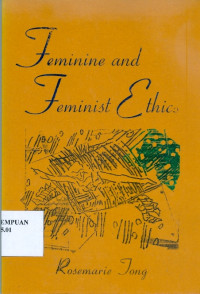
Text
Feminine and Feminist Ethic
Feminist Ethics is an attempt to revise, reformulate, or rethink traditional ethics to the extent it depreciates or devalues women's moral experience. Among others, feminist philosopher Alison Jaggar faults traditional ethics for letting women down in five related ways. First, it shows less concern for women's as opposed to men's issues and interests. Second, traditional ethics views as trivial the moral issues that arise in the so-called private world, the realm in which women do housework and take care of children, the infirm, and the elderly. Third, it implies that, in general, women are not as morally mature or deep as men. Fourth, traditional ethics overrates culturally masculine traits like “independence, autonomy, intellect, will, wariness, hierarchy, domination, culture, transcendence, product, asceticism, war, and death,” while it underrates culturally feminine traits like “interdependence, community, connection, sharing, emotion, body, trust, absence of hierarchy, nature, immanence, process, joy, peace, and life.” Fifth, and finally, it favors “male” ways of moral reasoning that emphasize rules, rights, universality, and impartiality over “female” ways of moral reasoning that emphasize relationships, responsibilities, particularity, and partiality (Jaggar, “Feminist Ethics,” 1992).
Feminists have developed a wide variety of gender-centered approaches to ethics, each of which addresses one or more of the five ways traditional ethics has failed or neglected women. Some feminist ethicists emphasize issues related to women's traits and behaviors, particularly their care-giving ones. In contrast, other feminist ethicists emphasize the political, legal, economic, and/or ideological causes and effects of women's second-sex status. But be these emphases as they may, all feminist ethicists share the same goal: the creation of a gendered ethics that aims to eliminate or at least ameliorate the oppression of any group of people, but most particularly women (Jaggar, “Feminist Ethics,” 1992).
Availability
| KP.II-00035-1 | KP.II ROS F | My Library | Available |
| KP.II-00035-3 | KP.II ROS F | My Library | Available |
| KP.II-00035-2 | KP.II ROS F | My Library | Available |
Detail Information
- Series Title
-
-
- Call Number
-
KP.II ROS F
- Publisher
- Belmont : Wadsworth Publishing., 1993
- Collation
-
x, 239 hal ; 23 cm
- Language
-
English
- ISBN/ISSN
-
0-534-17910-X
- Classification
-
KP.II
- Content Type
-
-
- Media Type
-
-
- Carrier Type
-
-
- Edition
-
-
- Subject(s)
- Specific Detail Info
-
-
- Statement of Responsibility
-
-
Other version/related
No other version available
File Attachment
Comments
You must be logged in to post a comment
 Computer Science, Information & General Works
Computer Science, Information & General Works  Philosophy & Psychology
Philosophy & Psychology  Religion
Religion  Social Sciences
Social Sciences  Language
Language  Pure Science
Pure Science  Applied Sciences
Applied Sciences  Art & Recreation
Art & Recreation  Literature
Literature  History & Geography
History & Geography